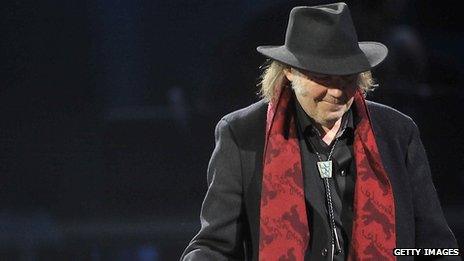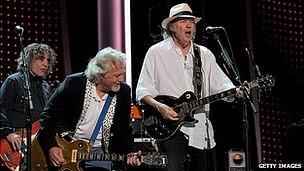Neil Young claims God Save the Queen as American folk song
- Published

After nine years apart, Neil Young has reunited with Crazy Horse for a new album of folk classics called Americana, which includes a version of God Save the Queen. And he tells BBC Radio 4's Front Row that he also has a double album of original material ready to go.
Neil Young admits that some may think God Save the Queen is an unusual choice for him to cover alongside American folk songs like Clementine and She'll Be Comin' Round The Mountain.
"There was no plan with that song," he explains.
"I just woke up one morning and in my mind I was hearing God Save the Queen."
As a Canadian he sang it at school every morning and says he felt it did fit with the Americana theme.
Neil Young included a choir on his cover of God Save the Queen
"I saw it as an important part of the record because of the American revolution - the declaration of freedom of the United States of America as a country. They were throwing off the reigns of the British Empire at that point."
He points out that pre-revolution it would have been sung by settlers, so it would have been part of the country's musical folk heritage.
In the version on Americana, Young has included a verse that has been dropped from the familiar version sung today. "It's the war-torn verse that doesn't get heard too much," he says.
"It was about the defence of the Queen and the greatness of the country - there's nothing to be ashamed of in that verse but it was dropped."
This reinstating of original lyrics is something that Young has done on all the other songs on the album, so they are very different to the versions that we know today.
"They are almost all dark but they're the same songs that kids sang in kindergarten. They have been sanitised over time," he explains.
Young researched all the original documents to find the original lyrics.
"It's very morbid, and there's a lot of depth and darkness and despair," he admits.
The album was recorded live, with few takes and a chemistry that Young says is unique to his work with Crazy Horse.
"There's nothing like that that I've experienced. It's in another class because of its roughness... the groove, the fun we have, how emotional we are about it.
And he says working with Crazy Horse also helps him to write. "It takes me to a different place, I'm able to express myself in a different way - [I'm] probably more free."
So how does he explain the nine-year gap since their last album together?
"I don't want to use Crazy Horse all the time because I don't want to abuse it, it's not something that you want to run into the ground."
Young was clearly inspired while making Americana as straight afterwards they recorded another album's worth of original Neil Young material.
"It will have to be a double CD because of its length," he admits. One track, he reveals, is 26 minutes long.
"There are a lot of excursions on this record that go off in different directions where we exploit the freedoms that we have," he explains.
Young is keen for people to hear Americana and his next album on vinyl. He is so concerned about the poor quality of sound on CDs and MP3s that he has set up a company that is building a prototype digital system that will create "an exact reproduction of whatever the artist created".
Neil Young's Clementine is much darker than the version sung by children
"A CD only has 15% of the data that we have on the original master - the MP3 has only 5% of what we have on the original," he explains and sees this as a "tremendous opportunity in the history of music".
Young emerged as part of counter-culture in the 1960s and his track Ohio, about four students shot while protesting, is credited by many as being the best ever protest song.
Six years ago he wrote an album to protest about the war in Iraq. He was waiting for someone of a younger generation to sing those protest songs - but no one did.
"Britney Spears didn't do it so I had to do it," he says with a laugh as he jokes about whether there is a young Bob Dylan on American Idol or the X Factor.
But asked where the equivalent is today of his track Ohio he is quick to point to social networking.
"It can topple governments - there is a big equivalent," he says.
"The only problem with the internet and social networking... is the music is not reflected in its full glory - it is like wallpaper.

Neil Young and Crazy Horse set off on a five-month tour of the US and Canada in August 2012
"If I have my way, I can bring quality back to digital music so you can really hear it and feel it... so you want to listen to it over and over again...because there's so much in it that your body craves more."
On the album Living with War, Young suggested Barack Obama as the next president three years before he was elected, when he was seen as a rank outsider. Young today calls that a "fluke".
"I'd met the future president at the time and I'd heard him speak and he reflected what a lot of Americans felt - he was quite a powerful force and he still is."
Americana is Young's 34th studio album. His albums from the 70s are seen as timeless classics but he says he does not dwell on his past success.
"That was my time to shine - everybody has a time to be first and that was my time to be first.
"But it doesn't really matter - what matters is the next thing and you're really only as good as the last thing you do."
The full interview with Neil Young will be on <link> <caption>Front Row</caption> <url href="http://www.bbc.co.uk/programmes/b01jhp10" platform="highweb"/> </link> on BBC Radio 4, Friday 8 June.
- Published17 November 2010
- Published14 September 2010